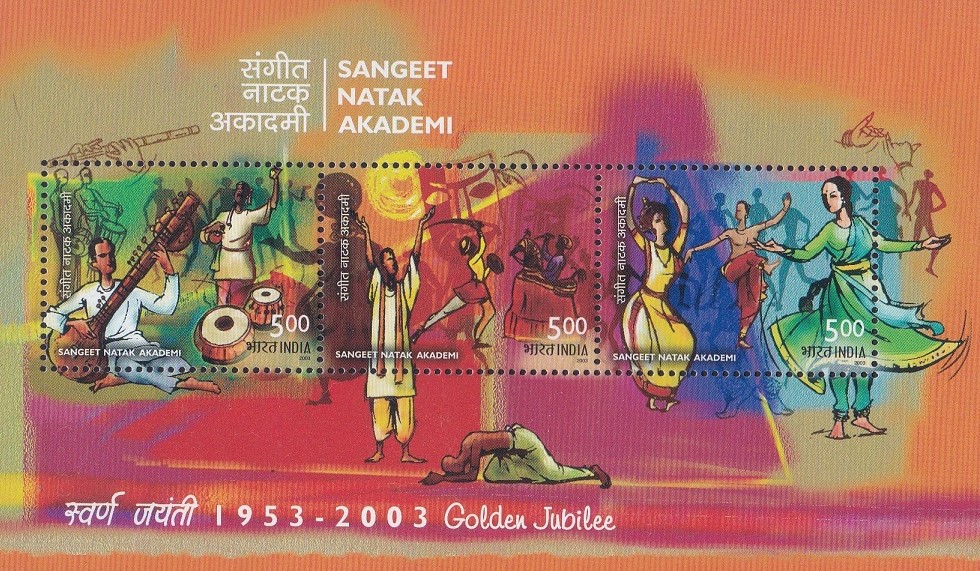
Sangeet Natak Akademi
A Miniature Sheet consisting of 3 nos. of postage stamp on the Golden Jubilee (1953-2003) of Sangeet Natak Academy (SNA), The National Academy for Music, Dance and Drama :
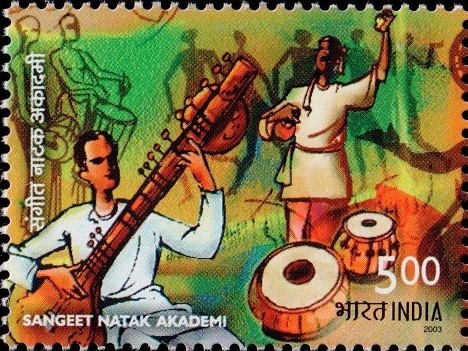
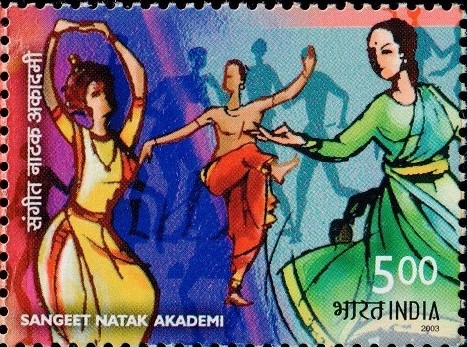
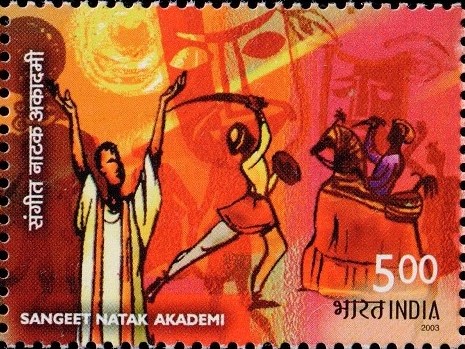

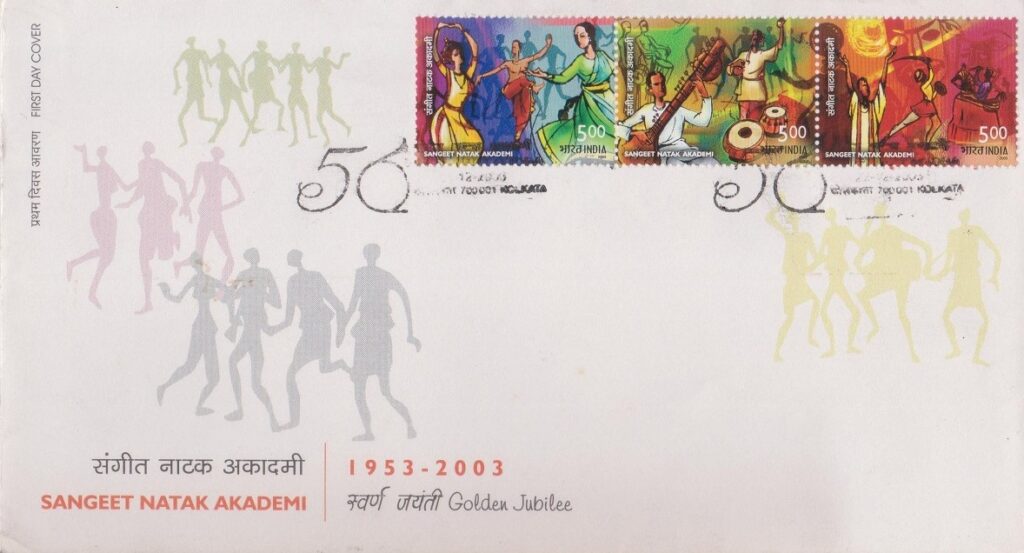
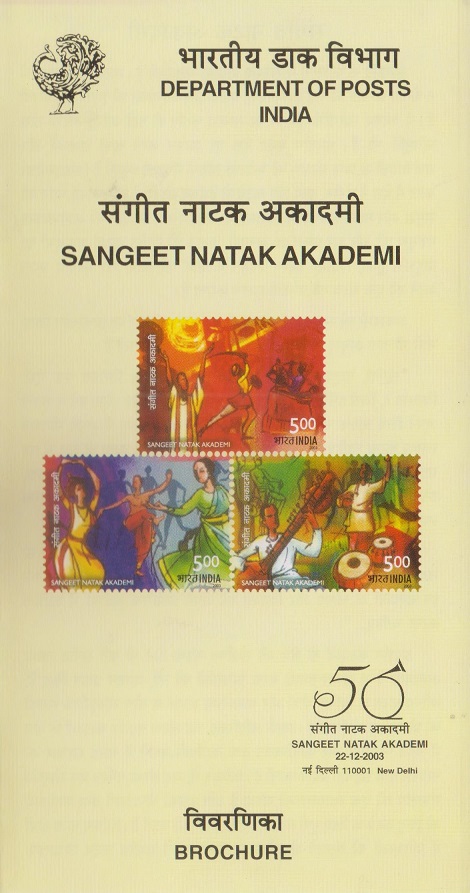 Issued by India
Issued by India
Issued on Dec 22, 2003
Issued for : The Akademi completed fifty eventful years of its existence in January this year. The Department of Posts celebrates its Golden Jubilee with the release of this set of three commemorative postage stamps and a miniature sheet which capture the vibrant spirit of the performing arts they portray.
Credits :
Stamp, Miniature Sheet & FDC : Kamleshwar Singh
Cancellation : Alka Sharma
Type : Miniature Sheet, Mint Condition
Colour : Multi Colour
Denomination : 500 Paise each
Overall size : 2.90 x 3.91 Cms.
Printing size : 2.90 x 3.91 Cms.
Perforation : 13.5 x 13.5
Paper : Matt Chromo
Stamps Printed : 0.8 million each
Miniature Sheet : 0.1 million
Number per issue sheet : 30
Printing Process : Photo Offset
Printer : Calcutta Security Printers Ltd.
About :
- Civilization is mirrored in its cultural patterns. The classical arts portray not merely its roots but also its developments. They provide a visual commentary on and are a concrete manifestation of abstract thought. Indian art has blossomed through the centuries by virtue of the patronage accorded to it by the various kings and statesmen who ruled the country. Post-independence India felt the need to preserve and promote the rich and vast cultural heritage expressed in diverse forms of music, dance and drama. And thus was born the Sangeet Natak Akademi on 28 January, 1953 with the objective of providing an institutionalized system of support and patronage to the performing arts.
- The thought behind the establishment of the Akademi is best expressed in the words of Maulana Abul Kalam Azad, the then Union Minister of Education: “India‘s precious heritage of music, drama and dance is one which we must cherish and develop. We must do so not only for our own sake but also as our contribution to the cultural heritage of mankind. Nowhere is it truer than in the field of art that to sustain means to create. Traditions cannot be preserved but can only be created afresh. It will be the aim of this Akademi to preserve our traditions by offering them an institutional form…. In a democratic regime, the arts can derive their sustenance only from the people, and the state, as the organized manifestation of the people’s will, must, therefore, undertake …. maintenance and development [of the arts] as one of [its] first responsibilities….“
- As the apex public body in the field of performing arts, the Sangeet Natak Akademi has not only opened new vistas for our art traditions, it has also fostered cultural contacts among the various regions in India and between India and the world. Besides, it renders advice and assistance to the Government of India in formulating and implementing policies and programmes in the field of performing arts. At present, the Akademi is an autonomous body of the Ministry of Tourism and Culture, Government of India and is fully funded for implementation of its schemes and programmes. The Akademi has also established institutions like the National School of Drama, Jawahar Lal Nehru Manipur Dance Academy at Imphal and Kathak Kendra – National Institute of Kathak Dance at New Delhi in order to chisel talent and create excellence in these areas. It has taken up National Projects to rejuvenate such ancient dance forms as Kutiyattam (Kerala), Chhau (Orissa) and Sattriya (Assam).
- The Sangeet Natak Akademi has instituted ‘Akademi Awards‘ that are conferred on practising artists as hallmarks of the meritorious service rendered by them in their respective fields. ‘Akademi fellowships‘ are conferred as the highest recognition on living masters. Distinguished ‘Akademi Fellows’ include Bharat Ratna Ravi Shankar, Bharat Ratna Bismillah Khan, Ebrahim Alkazi, Kapila Vatsyayan, Komal Kothari, Kelucharan Mohapatra, Mrinalini Vikram Sarabhai, Birju Maharaj, Ammannur Madhava Chakyar, Badal Sircar, Vijay Tendulkar, Balamurali Krishna, Bhupen Hazarika, Chairman and Shyamanand Jalan, Vice-Chairman of the Sangeet Natak Akademi.
- The Akademi functions as a storehouse of archives comprising audio/video tapes, photographs and films and a reference library comprising old books and unpublished manuscripts of rare nature as well as more than 600 musical instruments and dance costumes of rare nature to promote research in the field. A gallery of musical instruments was also inaugurated by renowned violinist Lord Yehudi Menuhin at Rabindra Bhawan in New Delhi where more than 200 musical instruments are displayed. The Akademi also gives grants-in-aid to individual workers and cultural organizations engaged in imparting higher training in music, dance and drama and for conducting research and surveys.
- Text : Based on material received from the proponent.


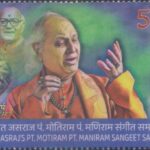
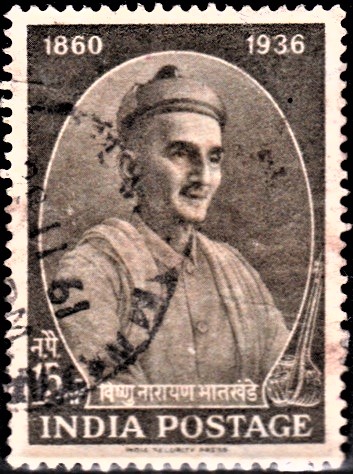



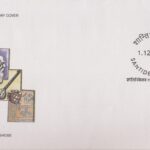
[…] laurels came in search of him. Ustad Bade Ghulam Ali Khan was elected Fellow of Sangeet Natak Academy and was honoured by the President of India with the title of ‘Padma Bhushan’. Vishwa Bharati […]
[…] Many awards and honours were conferred upon him, notable among them being the award of Sangeet Natak Akademi, Padmashri, Sangit Martand, Sangeet Samrat, and D. Litt. from Banaras Hindu […]
[…] Courtesy : Sangeet Natak Akademi. […]
[…] : Based on the material provided by Sangeet Natak Akademi and […]
[…] Text : Publications of Sangeet Natak Academy. […]
[…] Indian literary award, in 1962 for his book Rang Manch. This was followed by the Padma Shri and the Sangeet Natak Akademi Award in Punjabi Playwriting. Gargi is one of the few artists to win both the Sahitya Akademi and […]
[…] : Based on the material provided by Sangeet Natak Akademi and […]
[…] : Based on the material provided by Sangeet Natak Akademi and […]
[…] : Based on the material provided by Sangeet Natak Akademi and […]
[…] : Based on the material provided by Sangeet Natak Akademi and […]
[…] she had the honour of performing on eight consecutive nights in the Edinburgh festival. The Sangeet Natak Akademi conferred upon her its prestigious national award and she received the Padma Bhushan in 1957, […]
[…] artists of those days. His works earned him praise and recognition. The award of best lyricist by Sangeet Natak Academy and South India Film Chamber, the title of Sahitya Ratnakar and Kalaimamani, the award by the Tamil […]
[…] recognitions and awards came his way: Sangeet Natak Academy Award (1956), Padma Shri (1961), Padma Bhushan (1968), Padma Vibhushan (1980) are some of the […]
[…] long tenure in Bombay film industry making the folk songs a vessel of his own. He was awarded the Sangeet Natak Academy Award in 1958. S.D. Burman went into coma while recording the song Badi sooni (sung by Kishore […]
[…] 1966, Guruji received the prestigious Sangeet Natak Akademi Award. He was conferred with Padmashree in 1974 and Padma Bhushan in 1988. In 1993, Guruji […]
[…] Celebrations of the Marathi Theatre at Bombay. National recognition came when he received the Sangeet Natak Academy Award for acting in 1955, and the Padmabhushan award in […]
[…] awards and honours were conferred on him. These included the Ram Ganesh Gadkari Puraskar, the Sangeet Natak Academi Award, the Jnanpith Award and the Padma […]
[…] vibrant folk art, Yakshagana, received national and international recognition. The Sangeet Natak Akademi and the Sahitya Akademi conferred Fellowships on him and he received the Jnanpith Award (1978) for […]
[…] Chennai, the National Film Archives in Pune, the Film Federation of India and the Central and State Sangeet Natak Academies. He encouraged talent and nurtured newcomers to the world of cinema. Many of his protégés later […]